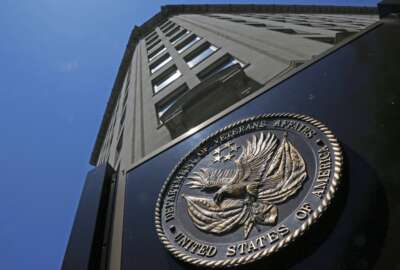VA rule change could mean health care benefits for a million more veterans
Veterans with other-than honorable discharges have often faced difficulties in securing health care benefits. A new VA rule could change that.
The Department of Veterans Affairs has made a major change in the rules for veterans who left military service with other-than honorable discharges. It opens the possibility of healthcare coverage for those who may have been discharged for willful misconduct or even moral turpitude. For detail, the Federal Drive with Tom Temin spoke with Anthony Kuhn, managing partner of the law firm Tully Rinckey.
Interview transcript:
Tom Temin Veterans Affairs has made a major change in the rules for veterans who left military service with other than honorable discharges. It opens the possibility of health care coverage for those who may have been discharged for willful misconduct or even moral turpitude. Details from the managing partner of the law firm Tully Rinckey, Anthony Kuhn. Anthony, good to have you back.
Anthony Kuhn Thanks for having me. Always a pleasure.
Tom Temin So, this is — seems revolutionary in the history of VA, because it’s been axiomatic that you have to have a good discharge to get benefits. So, what’s going on here?
Anthony Kuhn Yes, it is. You know, there’s been some steps in this direction in the past, but the VA hasn’t really committed to this initiative like they have with this new rule change. So, in the past, individuals who were separated for mental health conditions and, primarily they’re looking to try to take care of individuals who develop those conditions in combat. But it doesn’t — it’s not exclusive. So, there’s going to be other situations where individuals maybe developed PTSD symptoms or mental health issues in their military service, maybe in training, or even traumatic experiences that they suffered while on active duty. So, the VA here is — they’re changing the rule to try to expand, to capture those individuals. In the past, you had to file — you had to submit an application to the board for correction of military records and hope to get a discharge upgrade. There were some memoranda published by individuals, high-ranking individuals that directed the boards in the past to give liberal consideration to those individuals. Well, this is kind of a skirt around. So, now they’re looking at giving the VA the power to determine whether those individuals might be eligible for VA benefits that they otherwise wouldn’t be eligible for.
Tom Temin And is there any estimates that you’ve seen of how many people might be affected by this potentially?
Anthony Kuhn Well, I would expect it to be at least in the tens of thousands, given the number of applications that we file and the number of veterans that have flooded the boards with discharge upgrade requests in the past few years. There was — Secretary Hagel issued a memo back in 2018, which I just referred to a couple of minutes ago here. That memo urged veterans who had mental health conditions, especially post-traumatic stress disorder and things of that nature, to apply for a discharge upgrade. And what they had to show was that the stressors that they suffered through in the military were the foundation, really, for the misconduct, or that the misconduct could be tied to those things. And the way we did that is we would submit these applications to the board. We would show that this individual had good, service in the military, good honorable service. And then something traumatic happened to that individual. And then the misconduct followed, because the individual often struggled to deal with those mental health concerns. So, again, now the VA is saying that you can do that. You can still get your discharge upgrade. You can still file with the boards for correction of military records, which are unrelated to the VA. It’s a completely separate agency and organization. But now you can actually go to the VA and you can make that same argument. And hopefully the VA will make a quicker decision because the boards can take up to two years to make that decision. So, it’s creating another avenue. And maybe if one avenue doesn’t work, you try this avenue, and now you’ve got multiple avenues where you might be able to to seek service-connected compensation and medical treatment for the conditions.
Tom Temin And just as an aside, getting the upgrade in the discharge in the first place is probably desirable outside of being able to access VA benefits. It could help your career and prospects in other zones. Fair to say?
Anthony Kuhn Yes, absolutely. So, if you want your discharge upgraded for all purposes, employment, benefits, you can still go to the board for correction of military records and file that application. And if they grant a discharge upgrade and often when PTSD is involved or other mental health conditions, military sexual trauma, things of that nature, when those types of conditions come into play, the board will often grant the discharge upgrade. At least most of the boards. Air Force can be pretty tough on the case regardless, but most of the branches will liberally grant those discharge upgrades. So, this gives you another avenue now to to seek just VA benefits so they won’t upgrade your discharge. They’re not going to issue a new DD214, the release from active duty. They’re not going to make those changes because it’s a different agency. But they’re going to, I think, take a more liberal approach and start looking to help individuals with mental health concerns combat related hardships, things of that nature. They’re going to look to assist those individuals better than they have in the past.
Tom Temin We’re speaking with attorney Anthony Kuhn, managing partner of Tully Rinckey. And besides a rule change, this is kind of a theory change in recognizing that certain things that happened while on military duty or while in active service are, in fact, manifestations of damage that can happen to someone as a result of that service. That’s there’s an expansion there.
Anthony Kuhn Yes, there is. So in the past, there was a there was an avenue that most people didn’t know about, and it was kind of difficult. You could file with the VA, and you would request that the VA consider your discharge to be something other than dishonorable, for the purposes of the VA only. So, most people didn’t know about that. It’s very rare that veterans figure that out and are able to accomplish that. We’ve done that here, but most veterans aren’t aware of that. In fact, I did it with a Korean War veteran who had fought, I think, 40 years to try to establish his claim, and nobody was ever able to establish his claim. And the way that we were able to establish this claim is that I actually filed his board for correction of military records application, and at the same time, I filed with the VA for them to consider his discharge to be something other than dishonorable. And in those arguments, I included all the evidence that this individual had actually been shot in combat. He then came home, was treated and went back and was injured again in combat. So, this is an individual that they weren’t giving benefits to. So, it was a pretty easy decision, I think, for the VA. And they very quickly turned it over, and awarded him all of the benefits that he would have been entitled to, had gotten an honorable discharge, but he didn’t have an honorable discharge. Eventually, I was able to fix that as well at the board for correction of military records, but that took a lot longer. So, now, this process should speed that up. It gives us another avenue to try to get veterans the benefits that they should be entitled to, because nobody should get shot in combat and have to fight for 40 years to establish VA benefits.
Tom Temin Even with this new process, though, the veteran is still subject to the discretion of a VA judging official.
Anthony Kuhn They will be. So what they’re going to look for is cognitive impairments, mental health concerns, combat-related hardships, things of that nature. So individuals are going to still have to meet that burden and establish that those, conditions exist in order to qualify for VA benefits. But it should be a much quicker, much easier process than filing through the board for correction of military records and, for example, having to prove that there was an error or injustice in the way that the individuals separated.
Tom Temin And in general, it’s sometimes surprising how little recent veterans, or maybe not-so-recent veterans, are aware of all of the services that is available to them from VA. I mean, it’s just that’s the way the world works. And for those that have a less-than-honorable discharge, they might have figured, well, that’s the end of me in VA. See you later, Charlie. How does the word get out to people that they have a chance now, perhaps to have that upgrade or to get those benefits despite the discharge status they do have?
Anthony Kuhn And that’s exactly right. There are so many individuals out there that don’t even really understand the definition of veteran, because it’s different everywhere you go. So, some organizations will help veterans, but they define veteran differently than the VA. For me, you know, I want to give someone credit for going to basic training and making it through and serving in the military regardless of what happened that ended their military career. To me, that’s a veteran, but the VA disagrees. The VA says that a veteran is someone with an honorable discharge. So, there are questions about who are veterans and who’s going to obtain these benefits. So, I mean, it starts there, and it’s going to work through the VA to decide who they want to issue these benefits to, because some of these people are going to run into the issue of whether they’re actually a veteran. The VA is now saying that — they haven’t come out and clearly said this — but they’re at least inferring that they’re going to have to consider some of these people veterans regardless of what their discharge status is, because they say only veterans are entitled to VA benefits. So, it’s going to be interesting to see what they do with the definition of veteran as well moving forward.
Tom Temin Attorney Anthony Kuhn is managing partner of Tully Rinckey. Thanks so much for joining me.
Anthony Kuhn My pleasure. Anytime. Thanks for having me.
Tom Temin And we’ll post this interview at federalnewsnetwork.com/federaldrive. Hear the Federal Drive on demand. Subscribe wherever you get your podcasts.
Copyright © 2025 Federal News Network. All rights reserved. This website is not intended for users located within the European Economic Area.
Tom Temin is host of the Federal Drive and has been providing insight on federal technology and management issues for more than 30 years.
Follow @tteminWFED






